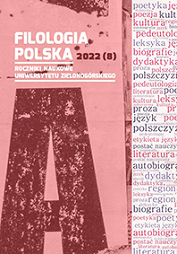To language through literature, to literature through language – about the correlated method in teaching heritage language learners
Keywords
Abstract
The heritage language and the mother tongue as school subjects are not the same. Therefore, they require a different approach; namely, in the case of teaching the heritage language, it is necessary to focus more on the language itself than on the historical and literary education of pupils. In the paper, we recommend to teachers Polish as a heritage language the correlated method based on teaching language through literature and literature through language. In this method, learners thoroughly develop their skills and competencies using an integrated approach. Moreover, they have multiple and varied contacts with the literary and educational variety of Polish.
References
Lipińska E., Dwujęzyczność kognitywna, „LingVaria” 2015, nr 2 (20).
[Google Scholar]
Lipińska E., Jeden język, wiele aspektów – o zróżnicowaniu polszczyzny w kraju i zagranicą w kontekście jej nauczania, [w:] Dydaktyka języka polskiego jako nierodzimego: konteksty – dylematy – trendy. Monografia zbiorowa, red. A. Seretny, E. Lipińska, Kraków 2021.
[Google Scholar]
Lipińska E., Podejście eklektyczne w nauczaniu polszczyzny za granicą na przykładzie wiersza Stanisława Barańczaka „Garden party”, „Postscriptum Polonistyczne” 2015, nr 2(16).
[Google Scholar]
Lipińska E., Seretny A., „Język odziedziczony” w szkołach polonijnych, „Głos Nauczyciela” 2012, R. XXVII, nr 1.
[Google Scholar]
Lipińska E., Seretny A., Język odziedziczony – polszczyzna pokoleń polonijnych, „Poradnik Językowy”, 2016, nr 10.
[Google Scholar]
Lipińska E., Seretny A., Między dydaktyką języka ojczystego a obcego – nauczanie języka polskiego w szkołach polonijnych w Stanach Zjednoczonych, [w:] (Nie)swój język polski. Nowe horyzonty w językoznawstwie stosowanym, red. B. Skowronek, Kraków 2012.
[Google Scholar]
Lipińska E., Seretny A., Między językiem ojczystym a obcym. Nauczanie i uczenie się języka odziedziczonego w chicagowskiej diasporze polonijnej, Kraków 2012.
[Google Scholar]
Lipińska E., Seretny A., O polszczyźnie literackiej na obczyźnie, „Postscriptum Polonistyczne” 2009, 2 (4).
[Google Scholar]
Lipińska E., Seretny A., Rozwijanie kompetencji językowych na bazie tekstów kultury – o kształceniu językowo-literackim w wariancie skorelowanym, „Uczymy, jak Uczyć. Kwartalnik Metodyczny dla Nauczycieli Polonijnych” 2017, nr 1-2.
[Google Scholar]
Lipińska E., Seretny A., Z domu lub ze szkoły – grupy mieszane: uczący się zróżnicowani ze względu na sposób i kontekst opanowania języka, [w:] Nauczanie języka polskiego jako obcego w grupach heterogenicznych, red. E. Lipińska, A. Seretny, Kraków 2019.
[Google Scholar]
Seretny A., Badania leksykalne w (glotto)dydaktyce polonistycznej, „Język Polski” 2018, nr 2.
[Google Scholar]
Seretny A., Czytanie ekstensywne, tekst w perspektywie glottodydaktycznej, „Postscriptum Polonistyczne” 2014, nr 3.
[Google Scholar]
Seretny A., Język szkolnej edukacji w perspektywie glottodydaktycznej – zarys problematyki, „Postscriptum Polonistyczne” 2018, nr 2.
[Google Scholar]
Seretny A., Polszczyzna jako język drugi w szkole. Wymagania leksykalne komunikacyjnej i edukacyjnej odmiany języka, „Neofilolog” 2022, nr 58/1.
[Google Scholar]
Seretny A., Polszczyzna w szkole, czyli język jako narzędzie poznania, [w:] Dydaktyka języka polskiego jako nierodzimego: konteksty – dylematy – trendy. Monografia zbiorowa, red. A. Seretny, E. Lipińska, Kraków 2021.
[Google Scholar]
Seretny A., Tekst literacki a nauczanie języka obcego, [w:] Literatura polska w świecie. Zagadnienia recepcji i odbioru, red. R. Cudak, Katowice 2006.
[Google Scholar]
Preview
Downloads
Published
How to Cite
Issue
Section
Categories
Copyright & License

This work is licensed under a Creative Commons Attribution-NonCommercial-NoDerivatives 4.0 International License.
Copyrights (a). In principle, authors who are not employed by the University of Zielona Góra retain the copyright, including publishing rights to the articles, without restrictions.
Copyrights (b). In principle, authors who are employed by the University of Zielona Góra, do not retain the copyright, including publishing rights to the articles. In such cases the copyright holder is the University of Zielona Góra.
Print ISSN
2450-3584-
Abstract271










































